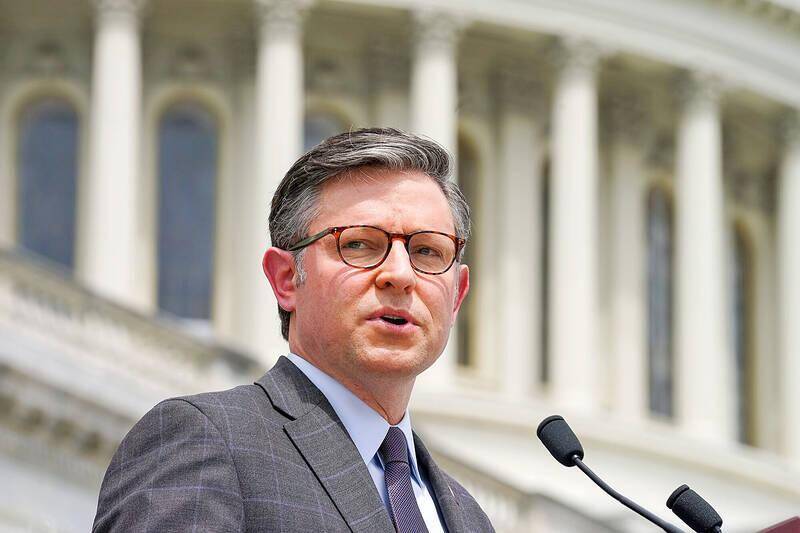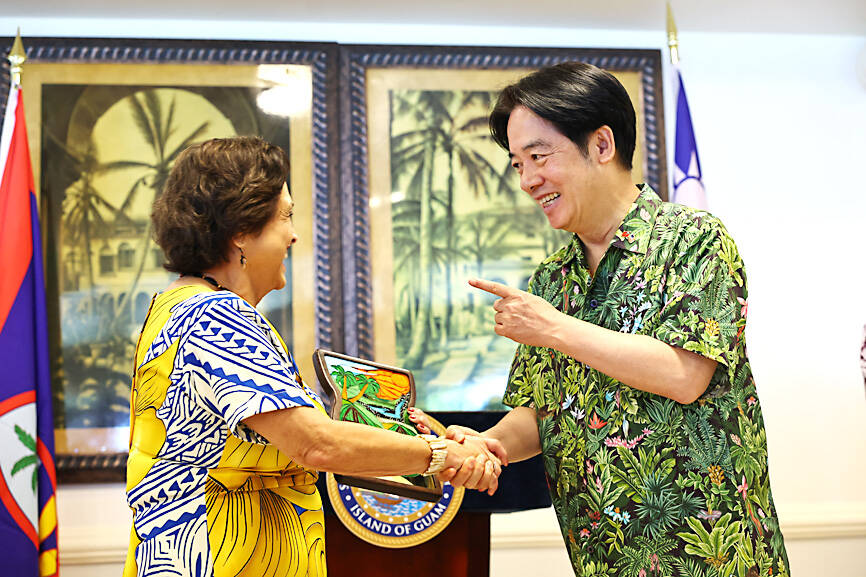US House of Representatives Speaker Mike Johnson said during a telephone call with President William Lai (賴清德) yesterday morning that recognition of Taiwan is at the core of the US’ Indo-Pacific strategy, Presidential Office spokesperson Karen Kuo (郭雅慧) said.
The call marked the first time Lai had spoken directly with Johnson, of the Republican Party, since taking office in May.
Lai also had a call with US House Minority Leader Hakeem Jeffries of the Democratic Party and a videoconference with Republican Senator Roger Wicker while in Guam, during a stopover on his way back from visiting the nation’s allies in the Pacific, Kuo said.

Photo: CNA
The US representatives emphasized the bipartisan congressional support to help Taiwan preserve its democracy and freedom, and to continue strengthening relations between the US and Taiwan, Kuo said.
Johnson said that the US Congress continues to pass bills to strengthen Washington’s response to China and its capacity to help Taiwan enhance its defense capabilities.
The speaker also mentioned Congress’ wariness of challenges and threats posed by China, and its recognition of Taiwan as being at the core of the US Indo-Pacific strategy, Kuo said.

Photo: Bloomberg
Lai told Wicker that Taiwan would not cower in the face of increasing threats and that his government was committed to boosting Taiwan’s defense capabilities and economic resilience, Kuo said.
The president expressed hope that both sides would further collaborate on national defense, she said.
Kuo also cited Wicker as saying that he was pleased to see Taiwan’s commitment to self-defense and that he would continue to support Taiwan’s security after taking up the chairmanship of the US Senate Committee on Armed Services next year.

Photo: CNA
Wicker is currently a ranking member of the committee.
Lai arrived in Guam on Wednesday evening after wrapping up a short visit to Taiwan’s Pacific ally Tuvalu.
Yesterday morning, Lai visited the legislature of Guam, making him the first Taiwanese president to visit the lawmaking body of the unincorporated US territory, a Presidential Office source said.
“Today, we gather to honor the enduring relationship between Guam and Taiwan built on decades of partnership and shared values,” Guamanian Legislative Speaker Therese M Terlaje said before presenting a copy of a resolution to Lai.
The resolution, passed by the legislature, welcomes “President Lai Ching-te [William]” and extends “our appreciation for Taiwan’s significant contributions to Guam’s economy and community.”
The “deep cultural, educational, health and economic connections ... have greatly benefited our islands,” Terlaje added.
Lai compared Taiwan and Guam to “family members,” citing the deep cultural connections between the two sides and their shared values of democracy, freedom and human rights.
“Moving forward, let us continue to work together to deepen cooperation between Taiwan and Guam,” jointly becoming a crucial force in defending freedom and democracy in the Indo-Pacific region, he said.
Lai, accompanied by Presidential Office and Cabinet officials, headed to Palau — the final destination of his South Pacific tour that has included stops in the US state of Hawaii and the Marshall Islands — yesterday afternoon.
He is to conclude his first overseas trip as president today.
While stopping over in Hawaii on Sunday, the president also had a 20-minute phone call with former US House speaker Nancy Pelosi, who visited Taiwan in 2022 when she was still speaker.

RESPONSE: The transit sends a message that China’s alignment with other countries would not deter the West from defending freedom of navigation, an academic said Canadian frigate the Ville de Quebec and Australian guided-missile destroyer the Brisbane transited the Taiwan Strait yesterday morning, the first time the two nations have conducted a joint freedom of navigation operation. The Canadian and Australian militaries did not immediately respond to requests for comment. The Ministry of National Defense declined to confirm the passage, saying only that Taiwan’s armed forces had deployed surveillance and reconnaissance assets, along with warships and combat aircraft, to safeguard security across the Strait. The two vessels were observed transiting northward along the eastern side of the Taiwan Strait’s median line, with Japan being their most likely destination,

GLOBAL ISSUE: If China annexes Taiwan, ‘it will not stop its expansion there, as it only becomes stronger and has more force to expand further,’ the president said China’s military and diplomatic expansion is not a sole issue for Taiwan, but one that risks world peace, President William Lai (賴清德) said yesterday, adding that Taiwan would stand with the alliance of democratic countries to preserve peace through deterrence. Lai made the remark in an exclusive interview with the Chinese-language Liberty Times (sister paper of the Taipei Times). “China is strategically pushing forward to change the international order,” Lai said, adding that China established the Asia Infrastructure Investment Bank, launched the Belt and Road Initiative, and pushed for yuan internationalization, because it wants to replace the democratic rules-based international

The National Development Council (NDC) yesterday unveiled details of new regulations that ease restrictions on foreigners working or living in Taiwan, as part of a bid to attract skilled workers from abroad. The regulations, which could go into effect in the first quarter of next year, stem from amendments to the Act for the Recruitment and Employment of Foreign Professionals (外國專業人才延攬及僱用法) passed by lawmakers on Aug. 29. Students categorized as “overseas compatriots” would be allowed to stay and work in Taiwan in the two years after their graduation without obtaining additional permits, doing away with the evaluation process that is currently required,

RELEASED: Ko emerged from a courthouse before about 700 supporters, describing his year in custody as a period of ‘suffering’ and vowed to ‘not surrender’ Former Taiwan People’s Party (TPP) chairman Ko Wen-je (柯文哲) was released on NT$70 million (US$2.29 million) bail yesterday, bringing an end to his year-long incommunicado detention as he awaits trial on corruption charges. Under the conditions set by the Taipei District Court on Friday, Ko must remain at a registered address, wear a GPS-enabled ankle monitor and is prohibited from leaving the country. He is also barred from contacting codefendants or witnesses. After Ko’s wife, Peggy Chen (陳佩琪), posted bail, Ko was transported from the Taipei Detention Center to the Taipei District Court at 12:20pm, where he was fitted with the tracking